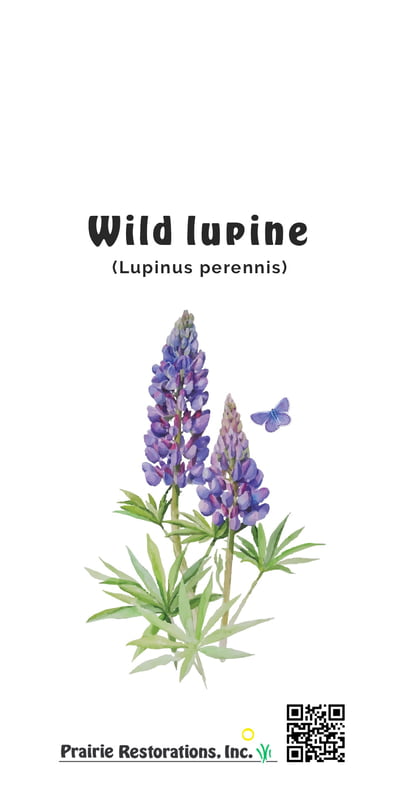









Lupinus perennis (Wild Lupine) Seed
Wild lupine Description:
Lupinus perennis, commonly known as wild lupine, is a herbaceous perennial plant that is native to North America. It belongs to the Fabaceae family and is found in dry, sandy soils in prairies, open woods, and along roadsides.
The plant typically grows to a height of 1-2 feet (30-60 cm) and spreads to about 1-2 feet (30-60 cm) in width. It has palmately compound leaves that are green on top and have a silvery-white underside, with each leaflet measuring up to 3 inches (7.6 cm) in length. The stem is typically hairy and erect.
In late spring to early summer, wild lupine produces spikes of showy, blue to purple, pea-like flowers that are arranged in dense clusters at the top of the stem. The flowers are about 1 inch (2.5 cm) long and are particularly attractive to bees, butterflies, and other pollinators.
Wild lupine is a popular garden plant and can be grown in well-drained soils in full sun to partial shade. It is a good choice for naturalized areas, meadow gardens, and butterfly gardens, as well as for attracting wildlife to the garden. The plant is also important ecologically as a nitrogen-fixing plant that contributes to soil fertility, and it plays a critical role in the life cycle of the endangered Karner blue butterfly, which relies on wild lupine as its larval host plant.
Wild lupine has a number of medicinal uses and has been traditionally used as a herbal remedy for a variety of ailments, including as an anti-inflammatory and pain reliever.
Native Range:
Wild lupine is isolated in Minnesota to the Eastern portions of the state. More broadly, Wild lupine is found in the Upper Midwest, Southern states, and East coast.
Standard Plant Information:
Plant Height: 1' - 2'
Bloom Time: May - June
Preferred Habitat: Does well in part shade to full sun and in dry sandy soil. Often found in fields, prairies, and woodland edges.
Stratification: C10, S
